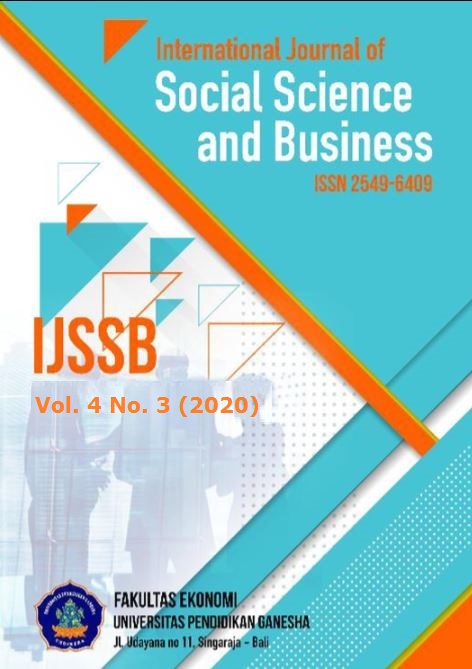Sustainable Fashion as The Early Awakening of the Clothing Industry Post Corona Pandemic
DOI:
https://doi.org/10.23887/ijssb.v4i3.26438Keywords:
sustainable fashion, fashion industry, pandemic coronaAbstract
The purpose of writing is an effort to rebuild a more sustainable fashion industry after COVID-19, and to move the fashion industry to adopt a sustainable fashion. The method used was a qualitative method with a qualitative descriptive approach. The technique of collecting data was a literature study or literature study, namely by diligently studying the literature needed in writing. The results of this writing were: (1) The experience of a global pandemic will create awareness of the importance of sustainable fashion, to rebuild the fashion industry after COVID-19 with high-quality durability; (2) Sustainability will be seen as the main product priority by all stakeholders, so by adopting a sustainable fashion concept, fashion industry players are expected to be willing to work together to create innovations that are more environmentally friendly and empower the industry. This paper concludes that the impact of the COVID-19 pandemic has brought together fashion industry players to jointly create sustainable fashion solutions for production, distribution, and consumption, and promote social change, the need for transparency and collaboration towards sustainability.
References
Bick, R., Halsey, E., & Ekenga, C. C. (2018). The global environmental injustice of fast fashion. Environmental Health: A Global Access Science Source, 17(1), 1–4. https://doi.org/10.1186/s12940-018-0433-7
Bly, S., Gwozdz, W., & Reisch, L. A. (2015). Exit from the high street: An exploratory study of sustainable fashion consumption pioneers. International Journal of Consumer Studies, 39(2), 125–135. https://doi.org/10.1111/ijcs.12159
Boström, M., & Micheletti, M. (2016). Introducing the Sustainability Challenge of Textiles and Clothing. Journal of Consumer Policy, 39(4), 367–375. https://doi.org/10.1007/s10603-016-9336-6
Choi, T. M., & Luo, S. (2019). Data quality challenges for sustainable fashion supply chain operations in emerging markets: Roles of blockchain, government sponsors, and environmental taxes. Transportation Research Part E: Logistics and Transportation Review, 131(September), 139–152. https://doi.org/10.1016/j.tre.2019.09.019
Cimatti, B., Campana, G., & Carluccio, L. (2017). Eco Design and Sustainable Manufacturing in Fashion: A Case Study in the Luxury Personal Accessories Industry. Procedia Manufacturing, 8(October 2016), 393–400. https://doi.org/10.1016/j.promfg.2017.02.050
Guan, W., Ni, Z., Hu, Y., Liang, W., Ou, C., He, J., Liu, L., Shan, H., Lei, C., Hui, D. S. C., Du, B., Li, L., Zeng, G., Yuen, K. Y., Chen, R., Tang, C., Wang, T., Chen, P., Xiang, J., … Zhong, N. (2020). Clinical characteristics of coronavirus disease in 2019 in China. New England Journal of Medicine, 382(18), 1708–1720. https://doi.org/10.1056/NEJMoa2002032
Henninger, C. E., Panayiota, J., & Alevizou, C. J. O. (2020). What is sustainable fashion? Journal of Fashion Marketing and Management, 20(4). https://doi.org/10.1108/JFMM-07-2015-0052
Hsiao, S. H., Wang, Y. Y., Wang, T., & Kao, T. W. (2020). How social media shapes the fashion industry: The spillover effects between private labels and national brands. Industrial Marketing Management, 86(July 2018), 40–51. https://doi.org/10.1016/j.indmarman.2019.02.022
Kutsenkova, Z. (2017). The Sustainable Future of the Modern Fashion Industry.
Lee, E. J., Choi, H., Han, J., Kim, D. H., Ko, E., & Kim, K. H. (2020). How to “Nudge” your consumers toward sustainable fashion consumption: An fMRI investigation. Journal of Business Research, 117(December 2018), 642–651. https://doi.org/10.1016/j.jbusres.2019.09.050
Scuotto, V., Del Giudice, M., Peruta, M. R. della, & Tarba, S. (2017). The performance implications of leveraging internal innovation through social media networks: An empirical verification of the smart fashion industry. Technological Forecasting and Social Change, 120, 184–194. https://doi.org/10.1016/j.techfore.2017.03.021
Sugiyono. (2016). Metode Penelitian Kualitatif, Kuantitatif, dan R&D. Alfabeta.
Tang, B., Wang, X., Li, Q., Bragazzi, N. L., Tang, S., Xiao, Y., & Wu, J. (2020). Estimation of the Transmission Risk of the 2019-nCoV and Its Implication for Public Health Interventions. Journal of Clinical Medicine, 9(2), 462. https://doi.org/10.3390/jcm9020462
Todeschini, B. V., Cortimiglia, M. N., & de Medeiros, J. F. (2020). Collaboration practices in the fashion industry: Environmentally sustainable innovations in the value chain. Environmental Science and Policy, 106(January), 1–11. https://doi.org/10.1016/j.envsci.2020.01.003
Wagner, M., Curteza, A., Hong, Y., Chen, Y., Thomassey, S., & Zeng, X. (2019). A design analysis for eco-fashion style using sensory evaluation tools: Consumer perceptions of product appearance. Journal of Retailing and Consumer Services, 51(December 2018), 253–262. https://doi.org/10.1016/j.jretconser.2019.06.005
Wang, H., Liu, H., Kim, S. J., & Kim, K. H. (2019). Sustainable fashion index model and its implication. Journal of Business Research, 99(December 2017), 430–437. https://doi.org/10.1016/j.jbusres.2017.12.027
Woodside, A. G., & Fine, M. B. (2019). Sustainable fashion themes in luxury brand storytelling: The sustainability fashion research grid. Journal of Global Fashion Marketing, 10(2), 111–128. https://doi.org/10.1080/20932685.2019.1573699











